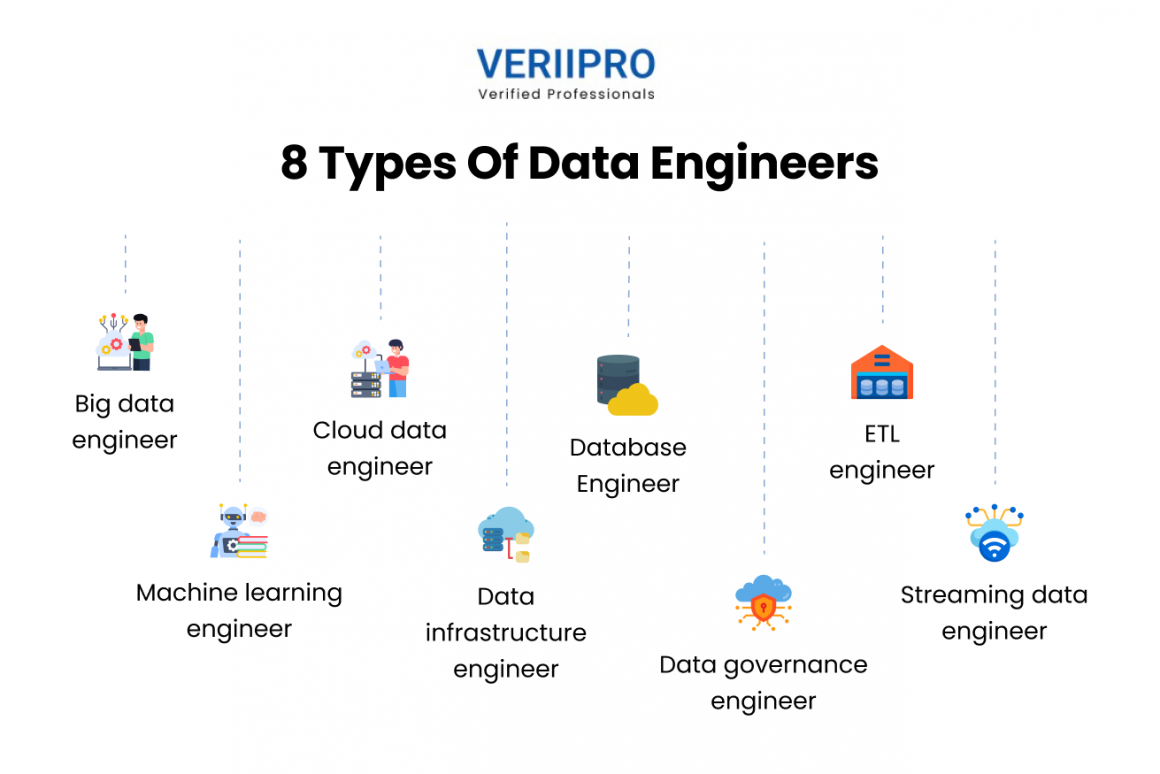Average Data Engineer Salaries: Insights and Trends
Even with some job losses earlier this year, American companies still really need skilled data engineers. Imagine this: the Bureau of Labor Statistics predicts a huge 35% increase in data-related jobs over the next few years. But here’s the hitch – there aren’t enough people with the right skills to fill those roles.
This high demand for data engineers is causing a funny situation: even though companies really want them, the salaries for these jobs aren’t going up very quickly. They’re only going up by about 2% each year, which isn’t much more than other tech jobs. But don’t worry! Despite the uncertainty in the economy, not many data engineers are without work, so there’s hope for the future. In fact, there are over 18,000 exciting data-related job openings out there, just waiting for the right people to snatch them up.
And here’s where Veriipro comes in: Veriipro is your ultimate partner in finding your dream data engineering job. With our extensive network and expertise in the IT industry, we can match you with the ideal job opportunities that align with your skills, experience, and career goals and help you grab an ideal data engineer salary package.
So, whether you’re just starting out or looking to level up your career, stick around. In this blog, we’ll break down everything you need to know about the world of data engineering. From the latest data engineer salary trends and what affects data engineering salaries to understanding what exactly a data engineer does and how much a data engineer makes, we’ve got all the info you need.
Decoding Data Engineer Salaries: Factors and Trends
As we step into 2024, the tech industry is still growing fast, with lots of opportunities for people. This is because technology keeps getting better, and we rely on digital stuff now, more than ever.
Here are the main trends in tech this year:
1. Increased demand for cutting-edge tech:
The demand for emerging tech skills is rising, but bonuses and pay hikes aren’t flowing as freely. Yet, there’s a silver lining: sharpen your skills, land better gigs, and watch your paycheck grow. Companies are hungry for tech wizards who can drive growth, and they’re actually paying more for skills in areas like cybersecurity, cloud computing, AI and machine learning, software development, and data science.
2. AI will stay on top, but it needs to prove itself:
For data engineers, it’s no surprise that companies will always need data-related products. And in 2024, nothing will be in higher demand than AI products that are put into action.
Companies don’t just want flashy AI features anymore. They want AI solutions that actually make a difference and work well.
In 2024, AI products will need to be more innovative and effective, helping organizations run better and giving customers a better experience.
Factors affecting data engineer salaries:
- Location: Where you work matters. Places like Silicon Valley pay more.
- Experience: The more experience you have, the higher your salary.
- Skills: If you have special skills like cloud computing or machine learning, you’ll likely earn more.
- Industry: Some industries, like finance or healthcare, pay better than others.
- Company size: Bigger companies with more money can pay higher salaries.
- Demand: If there’s a lot of demand for data engineers, salaries tend to go up.
Understanding Data Engineer Salary Ranges
According to Glassdoor, the average data engineer starting salary ranges from $120,000 to $197,000 per year, with additional pay ranging from $24,000 to $45,000. For senior data engineers, the average yearly pay rises to $154,989. In a nutshell, data engineers enjoy above-average salaries thanks to their specialized skills and the high demand for their expertise in the tech industry.
What Does a Data Engineer Do?
When it comes to understanding the role of a data engineer, think of them as the architects and builders of data. They are responsible for designing and constructing systems that can store and process vast amounts of information efficiently. Additionally, they ensure the smooth and secure operation of these systems.
The roles and responsibilities of a data engineer include:
- Building the infrastructure to handle large amounts of data.
- Creating systems that automatically move data from one place to another.
- Making sure the data is accurate and safe from hackers.
- Fixing any technical issues that pop up.
- Working closely with other data experts, like data scientists, to meet their needs and make sure everything runs smoothly.
In short, data engineers make sure data is collected, stored, and used correctly, helping businesses make smart decisions.
Different Types of Data Engineers and Their Specializations
Now that we’ve covered all the bases, let’s break down the various types of data engineers and what they specialize in:

1. Big data engineer:
They handle massive amounts of data using specialized tools like Hadoop or Spark.
2. Cloud data engineer:
They work on data solutions using cloud platforms like AWS or Azure.
3. Machine learning engineer:
They build and deploy machine learning models for data analysis and automation.
4. Data infrastructure engineer:
They design and optimize systems for storing and processing data.
5. Streaming data engineer:
They focus on real-time data processing and analysis.
6. Database engineer:
They manage and optimize databases for efficient data storage.
7. ETL engineer:
They build pipelines to extract, transform, and load data into databases.
8. Data governance engineer:
They ensure data compliance, quality, and security within organizations.
Ultimately, each type of data engineer has its own role in handling data effectively for businesses.
Join VeriiPro to Supercharge Your Data Career
Ready to level up in data engineering? VeriiPro gives you access to tons of top IT jobs across the USA, all vetted and ready for you. We’re experts at matching you with amazing companies and the latest tech.
Whether you’re into startups or big names, we’ve got connections. Plus, our team is here to help you nail your job search, from polishing your resume to acing interviews.
Stay in the know with our insights on industry trends and salaries.
Join VeriiPro today and kickstart your data-driven career!








